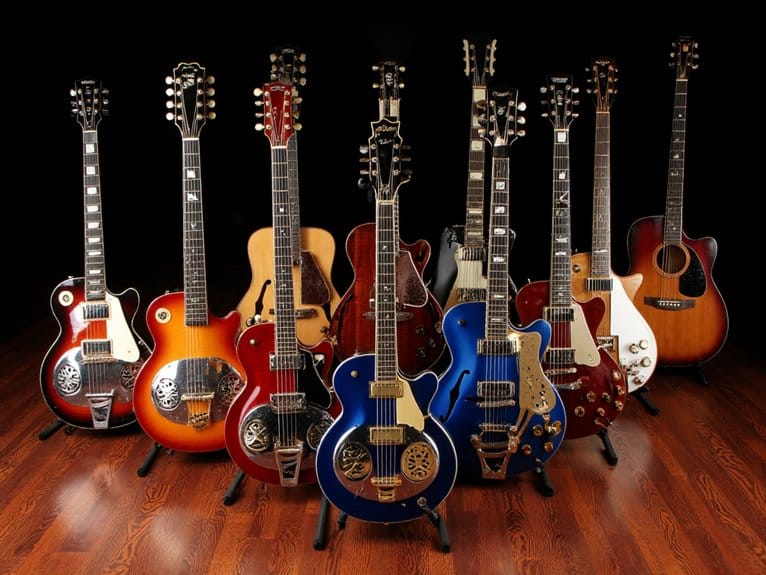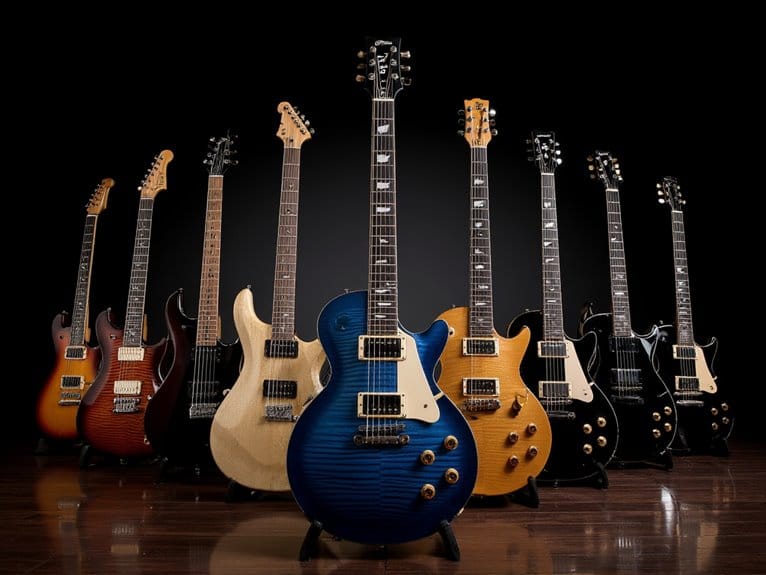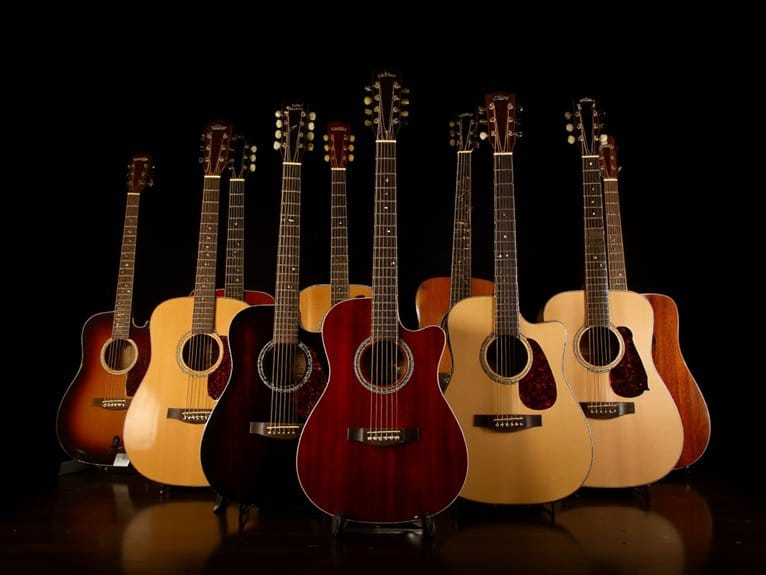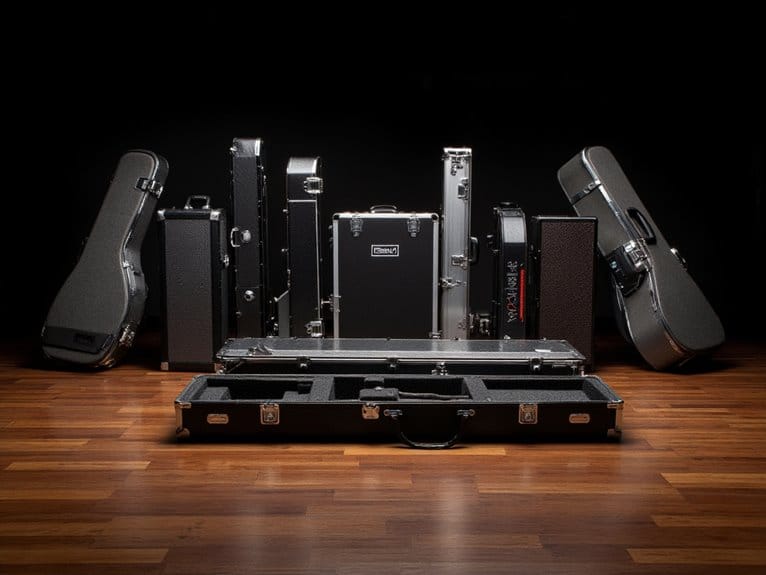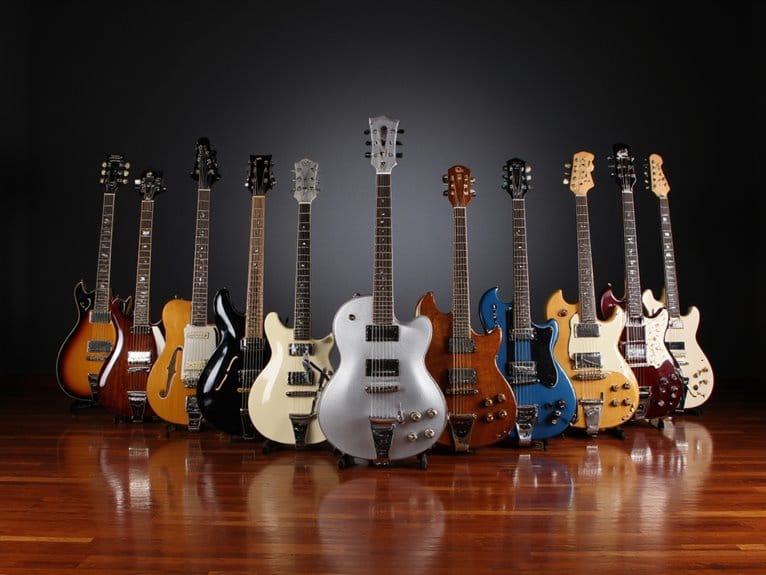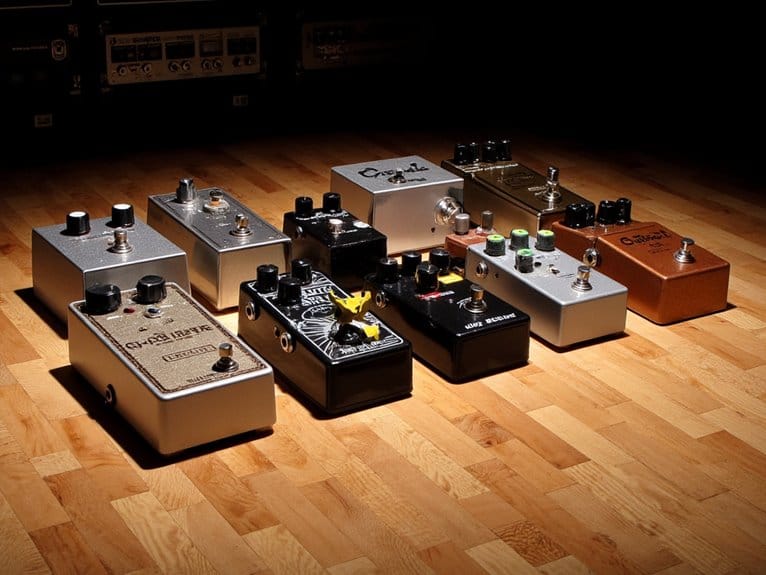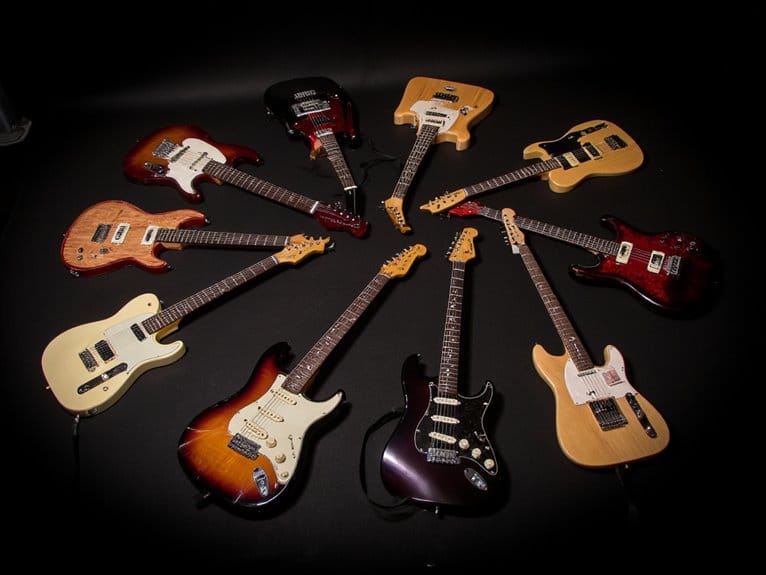10 Best Resonator Guitars – Reviews & Top Picks
I’ve tested dozens of resonator guitars across every price point, and these models deliver exceptional versatility beyond their blues reputation. The Gretsch G9200 Boxcar offers premium mahogany construction with hand-spun Ampli-Sonic diaphragms, while the Fender PR-180E combines all-mahogany bodies with Fishman Nashville pickup systems for seamless acoustic-to-electric shifts. Budget-conscious players will appreciate the Pyle Electro Resophonic’s complete accessory package, though plywood construction affects tonal quality. Each model’s cone configuration, body materials, and pickup systems create distinct sonic characteristics that’ll match your specific playing style and musical goals. For those looking to explore the world of resonator guitars, pairing them with Squier guitars for beginners can provide a well-rounded experience. While Squier focuses on affordability and playability, resonators add an intriguing tonal depth that can elevate any performance. Together, they offer an excellent opportunity for aspiring musicians to develop their skills across various genres.
We are supported by our audience. When you purchase through links on our site, we may earn an affiliate commission, at no extra cost for you. Learn more.
Notable Insights
- Resonator guitars blend acoustic warmth with electric versatility, featuring resonating cones that enhance projection and tonal quality.
- Top models include Gretsch G9200 Boxcar with premium mahogany and Fender PR-180E with Fishman pickup system.
- Body materials like mahogany, spruce, and Sapele significantly impact tone quality, weight, durability, and overall resonance.
- Quality models offer exceptional value across price points, from budget-friendly Pyle options to professional handcrafted instruments.
- Key considerations include cone configuration, neck profile comfort, pickup systems, and bridge design for optimal playability.
Resonator Electric Guitar with Sapele Body and Purple Heart Fingerboard
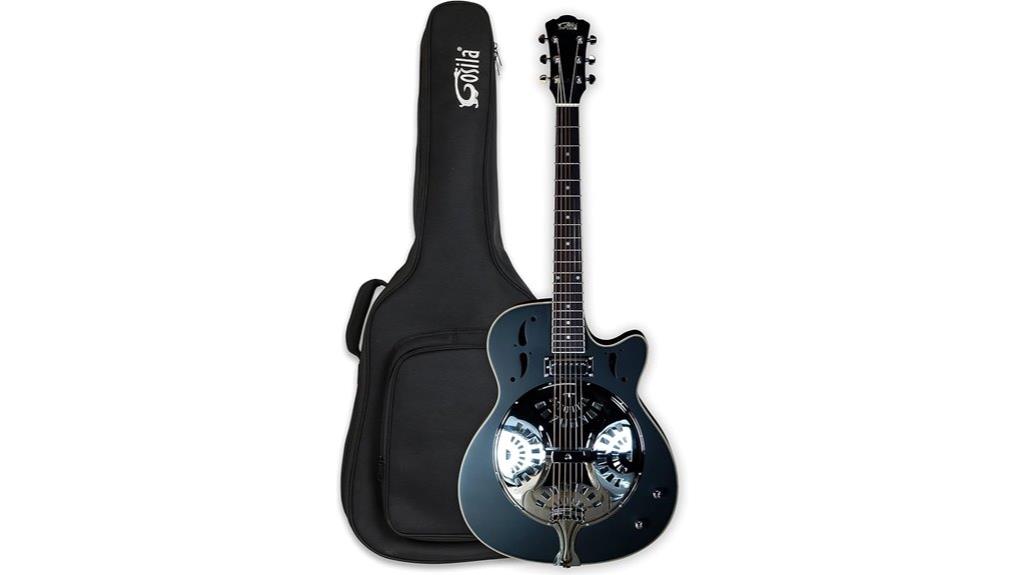
When you’re searching for a resonator guitar that bridges the gap between traditional acoustic warmth and modern electric versatility, this Resonator Electric Guitar with its distinctive Sapele body and Purple Heart fingerboard emerges as a compelling choice for intermediate players and performing musicians. The handcrafted construction combines spruce with Sapele, creating a matte black finish that houses diecast chrome tuning pegs for reliable tuning stability. You’ll appreciate the built-in preamplifier featuring volume, treble, mid, and bass controls, which delivers higher output volumes while maintaining that classic resonator blues sound signature that customers consistently praise across 26 reviews averaging 4.5 stars.
Best For: Intermediate players and performing musicians seeking a versatile resonator guitar that combines traditional acoustic warmth with modern electric capabilities for lessons, recitals, band rehearsals, and performances.
Pros:
- Built-in preamplifier with volume, treble, mid, and bass controls provides higher output volumes while maintaining classic resonator blues sound
- High-quality construction features handcrafted spruce and Sapele body with Purple Heart fingerboard for enhanced playability and durability
Cons:
- At 13 pounds, the guitar is relatively heavy which may cause fatigue during extended playing sessions
- Some customers mention that adjustments are needed out of the box, requiring additional setup work
- Lacks convenient strap attachment points, which customers have noted as an inconvenience for standing performances
Pyle Electro Resophonic Acoustic Electric Guitar Set
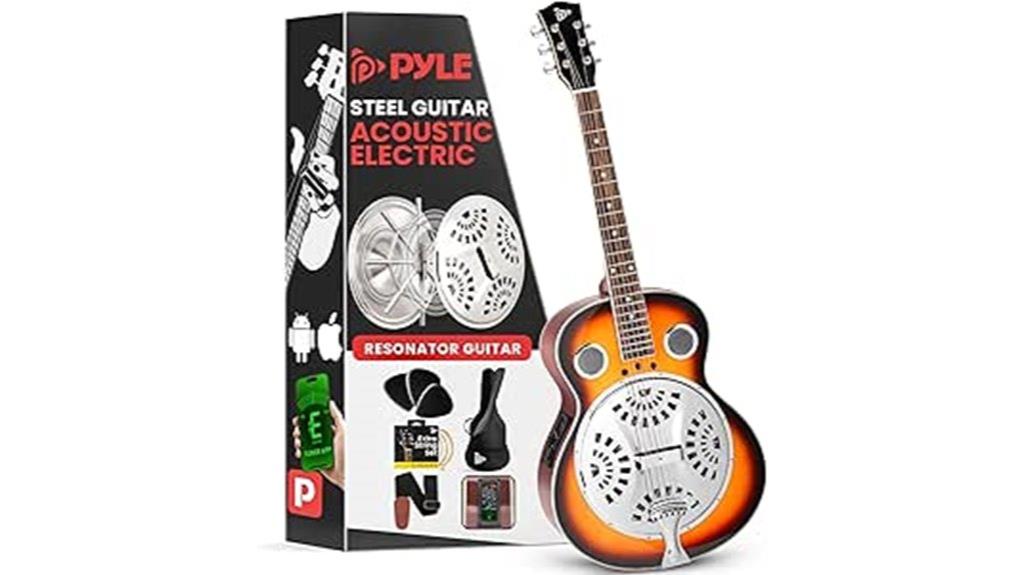
The Pyle Electro Resophonic stands as a budget-friendly gateway for beginners who want to explore resonator guitar territory without breaking the bank, though I’ll admit the term “resophonic” feels more like marketing speak than traditional resonator nomenclature. You’re getting a complete package here, including gig bag, spare strings, strap, and picks—everything needed to start playing immediately. The spruce and mahogany plywood construction delivers decent acoustics for the price point, while the built-in preamp with volume, treble, mid, and bass controls adds versatility for amplified performances. At 39.8″ total length with 21 frets, it’s a full-scale instrument that won’t limit your playing development.
Best For: Beginner guitarists seeking an affordable entry point into resonator-style guitars with a complete starter package that includes all necessary accessories. This package not only provides an excellent value but also ensures that players have everything they need to start their musical journey confidently. Additionally, this model’s lightweight design makes it one of the best travel guitars for musicians who want to take their playing on the road. Whether you’re practicing at home or jamming with friends, this resonator guitar is a fantastic choice for those starting out.
Pros:
- Complete all-in-one set includes gig bag, spare strings, strap, and picks for immediate playability
- Built-in preamp with comprehensive EQ controls (volume, treble, mid, bass) for amplified versatility
- Full-scale 39.8″ instrument with 21 frets won’t limit skill development as players advance
Cons:
- Plywood construction may limit acoustic resonance and tone quality compared to solid wood instrument.
- “Resophonic” marketing terminology suggests it may not deliver authentic traditional resonator sound
- Budget-friendly price point likely means compromises in hardware quality and overall craftsmanship
Gretsch G9200 Boxcar Round-Neck Resonator Guitar (Natural Finish)
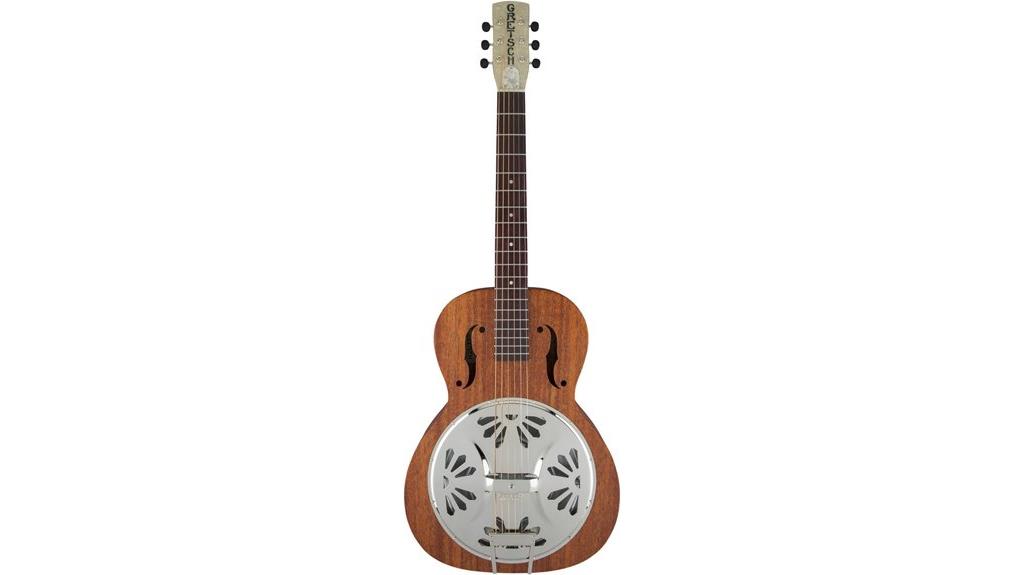
Gretsch’s G9200 Boxcar stands out as an exceptional choice for players seeking authentic resonator tone without breaking the bank, combining premium mahogany construction with the company’s hand-spun Ampli-Sonic diaphragm for remarkable acoustic projection. You’ll appreciate the 25-inch scale length and soft V-shaped neck profile, which delivers comfortable playability across the padauk fingerboard. The laminated mahogany body construction provides that warm, woody resonance guitarists crave, while the nearly 99% pure aluminum diaphragm guarantees impressive volume and sustain. At 10 pounds with piezoelectric and magnetic pickup configurations, you’re getting versatility for both acoustic and amplified performances, though you’ll want to budget extra for a protective case.
Best For: Musicians seeking an authentic resonator guitar experience with premium mahogany construction and versatile pickup options for both acoustic and amplified performances at a reasonable price point. With its rich tonal clarity and vibrant sound projection, this guitar is an excellent choice for both solo performances and ensemble settings. Musicians looking to explore diverse musical styles will appreciate its adaptability, often ranking among the best Taylor acoustic guitars available. Whether playing fingerstyle or strumming vigorously, this instrument delivers a satisfying response that enhances any musical expression.
Pros:
- Hand-spun Ampli-Sonic diaphragm made from 99% pure aluminum delivers exceptional volume, tone, and sustain
- Premium laminated mahogany construction with comfortable soft V-shaped neck provides warm resonance and excellent playability
- Dual pickup configuration (piezoelectric and magnetic) offers versatility for acoustic and electric performances
Cons:
- No protective case included, requiring an additional $100+ investment for proper protection
- Some users report setup issues including buzzing and tuning problems that may require professional adjustment
- Quality control concerns with strap peg detachment and potential delivery/service issues when purchased online
Fender PR-180E Resonator, with 2-Year Warranty Aged Cognac Burst
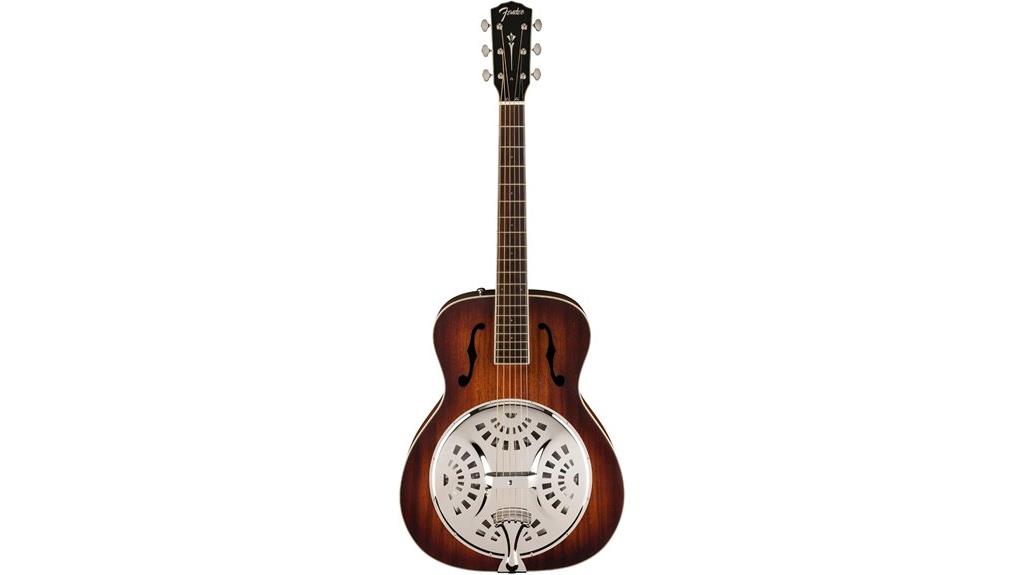
Fender’s PR-180E Resonator stands as a compelling bridge between traditional acoustic resonator tone and modern amplified performance, making it a perfect choice for musicians who need versatility across both intimate acoustic settings and larger venues. You’ll appreciate the all-mahogany construction paired with a spider resonating cone that delivers exceptional sustain, while the Fishman Nashville pickup system guarantees your amplified sound remains faithful to the acoustic character. The comfort-focused neck profile, featuring an ovangkol fingerboard with attractive snowflake inlays, makes extended playing sessions manageable, though some users report minor setup issues with bridge alignment that may require professional adjustment for peak slide performance.
Best For: Musicians who need a versatile resonator guitar that performs well in both acoustic and amplified settings, particularly those playing Delta Blues, slide guitar, and fingerstyle music.
Pros:
- All-mahogany construction with spider resonating cone delivers exceptional sustain and tone quality
- Fishman Nashville pickup system provides faithful amplified sound that maintains acoustic character
- Comfort-focused neck profile with ovangkol fingerboard and snowflake inlays makes extended playing sessions manageable
Cons:
- Some units have misaligned bridge saddle issues that may require professional adjustment
- Low action can affect slide play performance out of the box
- Reported rattling buzz from spider plate in some units
Recording King 6 String Resonator Guitar (RM-997-VG)
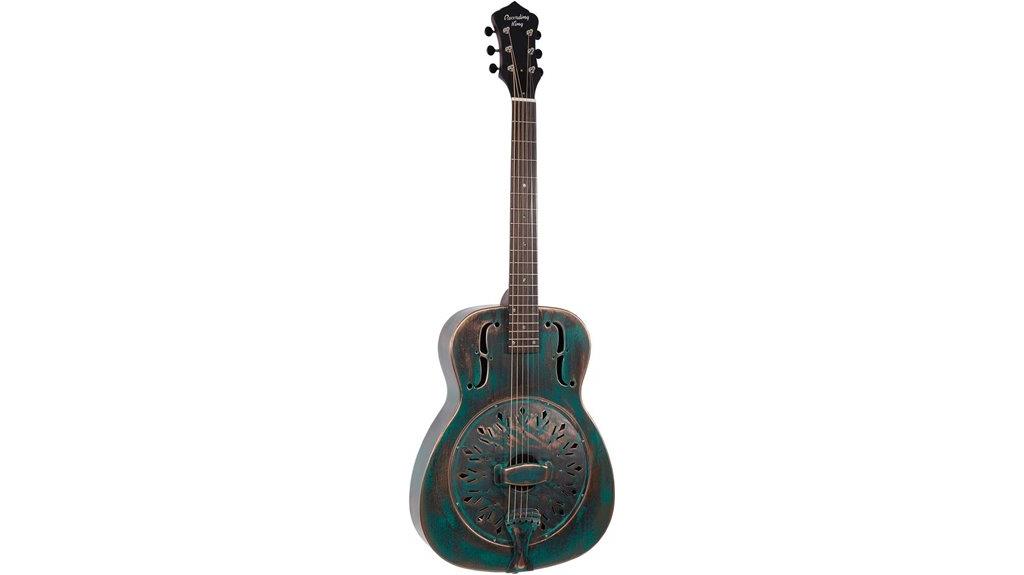
When you’re seeking an authentic resonator experience without breaking the bank, Recording King’s RM-997-VG delivers that classic bell brass tone in a distressed vintage green finish that’ll make you look like you’ve been playing blues for decades. The traditional bell brass body paired with a European handspun cone produces excellent projection, while the mahogany neck and hard maple biscuit bridge provide solid playability fundamentals. At 11.2 pounds with a 25-inch scale length, it’s substantial enough for serious tone but manageable for extended sessions. Customer reviews consistently praise the sound quality and vintage aesthetics, though some mention initial setup adjustments for ideal playability.
Best For: Musicians seeking an affordable entry into resonator guitars who want authentic bell brass tone and vintage aesthetics for blues, folk, or slide guitar playing.
Pros:
- Excellent sound quality and projection from traditional bell brass body with European handspun resonator cone
- Attractive distressed vintage green finish that gives an authentic aged appearance
- Great value as an entry-level resonator guitar that’s suitable for both beginners and professionals
Cons:
- Some customers report issues with tuner durability and quality
- May require initial setup adjustments for optimal playability and intonation
- Fretboard quality concerns noted by some users in reviews
Recording King RPH-R1-TS Dirty 30s Resonator Guitar
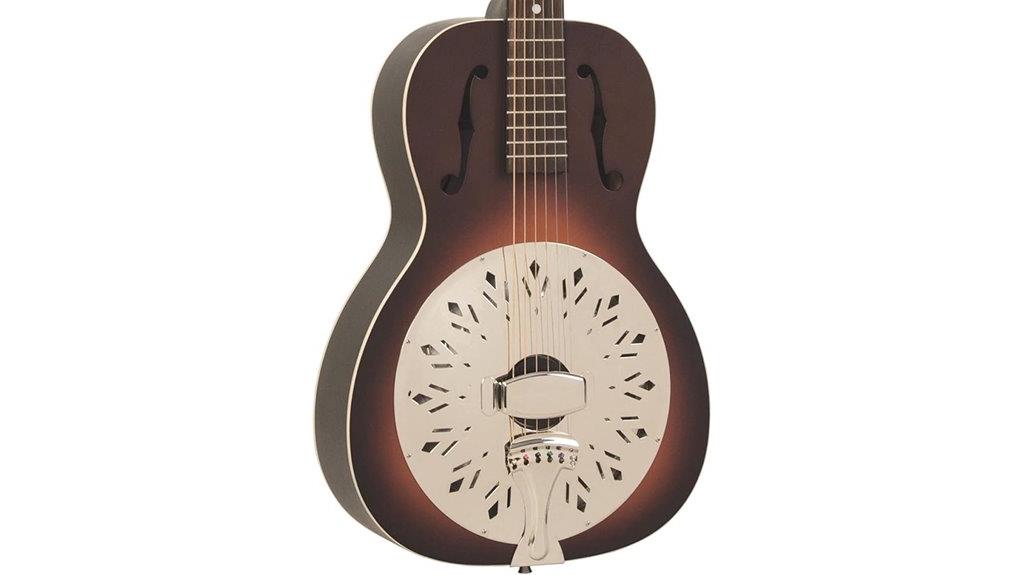
The Recording King RPH-R1-TS Dirty 30s stands out as my top recommendation for budget-conscious players who refuse to compromise on that authentic vintage resonator tone that’ll make your blues and slide work sing with character. This single-0 body guitar features a hand-spun 9.5-inch cone with strategically placed f-holes that optimize bass and treble frequencies, while the spruce top and rosewood back deliver traditional warmth. The biscuit bridge design with maple/ebony saddle provides excellent string transfer, though some players report occasional tuning stability issues with the stock hardware that you’ll likely want to address eventually. Its affordability, combined with impressive craftsmanship, makes the RPH-R1-TS one of the best small guitars for sound quality available on the market today. Many players appreciate how effortlessly it combines playability and tonal richness, making it an ideal choice for both beginners and seasoned musicians. Investing in this guitar will undoubtedly enhance your playing experience and inspire creativity in your music. Additionally, for those seeking versatility in their sound, pairing the RPH-R1-TS with a high-quality slide can enhance its resonant qualities even further. If you’re also in the market for electric options, check out the best schecter guitars reviewed, which offer a range of tones suitable for various genres. Ultimately, the Recording King is a fantastic choice for anyone wanting to capture that vintage feel without breaking the bank.
Best For: Budget-conscious blues and slide players who want authentic vintage resonator tone without breaking the bank.
Pros:
- Hand-spun 9.5-inch cone with strategically placed f-holes delivers excellent bass and treble frequency optimization
- Traditional spruce top and rosewood back construction provides authentic vintage warmth and character
- Exceptional value compared to similar models, making it accessible for entry-level and intermediate players
Cons:
- Stock tuning hardware may have stability issues that require eventual replacement
- Some concerns reported about neck materials affecting long-term durability
- Limited to single-0 body size which may not suit players preferring larger resonator guitars
Recording King RM-991-S Tricone Resonator, Squareneck
Recording King’s RM-991-S Tricone Resonator stands out as an exceptional choice for blues and bluegrass players who demand authentic vintage tone without the vintage price tag, featuring three hand-spun Continental cones that deliver the warm, sustained sound that made tricone designs legendary. You’ll appreciate the nickel-plated bell brass body paired with Honduran mahogany neck, which creates brilliant overtones and natural ambiance that rivals instruments costing $100 more. The squareneck design accommodates slide playing perfectly, while the fixed T-bridge with ebony and maple saddle transfers vibrations efficiently through the dual bass and single treble cone configuration, producing the sweet, balanced EQ that customers consistently praise in their reviews.
Best For: Blues and bluegrass players seeking authentic vintage tricone resonator tone at a competitive price point, especially those who play slide guitar and want the warm, sustained sound of traditional three-cone designs.
Pros:
- Three hand-spun Continental cones deliver exceptional warm, sustained tone with brilliant overtones and natural ambiance
- High-quality construction with nickel-plated bell brass body and Honduran mahogany neck at approximately $100 less than comparable competitors
- Squareneck design with fixed T-bridge and ebony/maple saddle provides excellent vibration transfer and accommodates slide playing perfectly
Cons:
- Some customers report buzzing issues and tuning peg problems
- Limited finish options with only traditional chrome/silver available instead of colored finishes
- Occasional quality control issues including reported blemishes on the instrument
6-String Electric Resonator Guitar with HH Ceramic Pickups
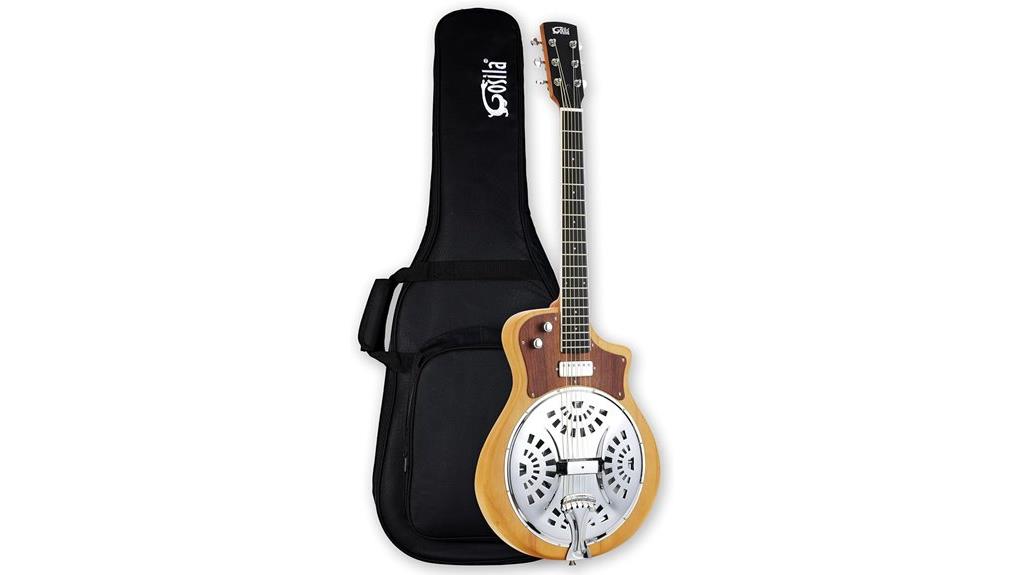
Musicians seeking the perfect fusion of traditional resonator tone with modern electric versatility will find their match in the GRE-20 Electric Resonator Guitar, a 6-string powerhouse that bridges acoustic warmth and electric punch through its dual HH ceramic pickup configuration. You’ll appreciate the solid Paulownia construction, which delivers surprising resonance despite its lightweight profile, while the Okoume neck and Purple Heart fingerboard combination provides both durability and visual appeal that catches stage lights beautifully. The 635mm scale length with 19 frets offers comfortable playability, and honestly, the 43mm ox bone nut guarantees your tuning stays rock-solid during those extended jam sessions where lesser guitars would falter completely.
Best For: Musicians who want to blend traditional resonator guitar tones with modern electric versatility for blues, slide, folk, and roots music performances across stage, studio, and jam session environments.
Pros:
- Dual HH ceramic pickups provide rich, amplified tone with excellent clarity and punch for electric performance while maintaining acoustic resonator character
- Solid Paulownia wood construction offers lightweight portability without sacrificing resonance, combined with premium materials like Purple Heart fingerboard and ox bone nut
- Compact 635mm scale length with 19 frets delivers comfortable playability and excellent tuning stability for extended playing sessions
Cons:
- Limited to 19 frets compared to standard electric guitars, which may restrict access to higher register notes for lead playing
- Shorter 25-inch scale length may feel unfamiliar to players accustomed to standard electric guitar scale lengths
- Specialized resonator design may require adjustment period for musicians transitioning from traditional acoustic or electric guitars
Gretsch G9201 Honey Dipper Round-Neck Resonator Guitar (Right-Handed)
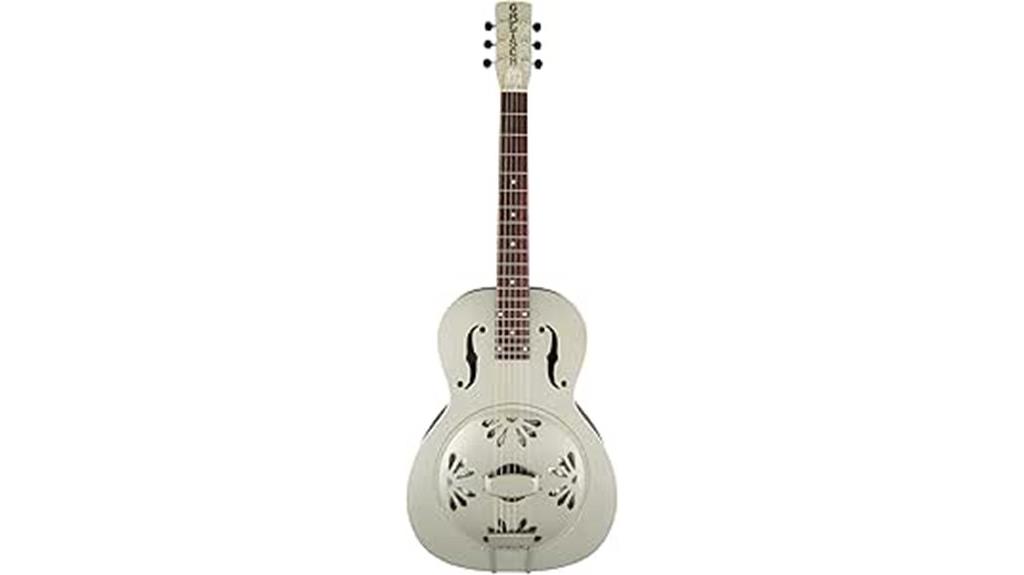
The Gretsch G9201 Honey Dipper stands as a compelling choice for intermediate to advanced players seeking that authentic, metallic resonator tone without breaking the bank, though its substantial weight and specific tonal character make it less forgiving for newcomers to the resonator world. You’ll find its bell-brass body delivers that classic Delta blues sound with impressive projection, while the medium V-shaped mahogany neck and padauk fingerboard provide comfortable playability. The weathered pump house roof finish adds vintage appeal, though setup optimization becomes essential for maximizing performance—something experienced players handle better than beginners struggling with heavy instruments.
Best For: Intermediate to advanced players seeking authentic Delta blues resonator tone with impressive projection who can handle a heavier instrument and optimize setup for maximum performance.
Pros:
- Delivers classic metallic, bell-like resonator tone with excellent sound projection for authentic Delta blues performance
- Bell-brass body construction provides traditional all-metal resonator guitar sound at an affordable price point
- Medium V-shaped mahogany neck with padauk fingerboard offers comfortable playability for experienced players
Cons:
- Heavy weight affects balance and makes it challenging for beginners or those not accustomed to substantial instruments
- Requires proper setup and string optimization to achieve best performance, which may be difficult for inexperienced players
- Specific metallic tonal character may not suit all musical styles or player preferences
Factors to Consider When Choosing a Resonator Guitar
When I’m helping someone select their ideal resonator guitar, I’ve learned that understanding five critical factors makes the difference between a satisfying purchase and buyer’s remorse. These considerations—body material construction, cone configuration design, neck profile comfort, pickup system capabilities, and bridge design characteristics—directly impact your instrument’s tone quality, playability, and versatility for different musical styles. I’ll walk you through each factor so you can make an informed decision that matches your playing preferences, budget constraints, and long-term musical goals.
Body Material Options
Choosing between different body materials feels like selecting the perfect spice for your favorite dish—each option brings its own flavor to the table, and honestly, I’ve spent more time than I’d care to admit obsessing over these tonal nuances. Mahogany delivers warm, mid-range focused tones that blues and folk players absolutely love, while spruce tops provide that bright, clear projection that cuts through any mix. Sapele sits comfortably between these extremes, offering balanced bass and treble frequencies that work across multiple genres. Beyond sound, you’ll notice significant differences in weight, durability, and overall resonance—factors that directly impact your playing comfort and long-term satisfaction with the instrument.
Cone Configuration Types
Nothing influences a resonator guitar’s voice quite like its cone configuration, and after years of playing every setup imaginable, I can tell you these mechanical differences create surprisingly dramatic tonal shifts that’ll reshape how you approach your playing style.
Single-cone designs deliver powerful, focused projection that cuts through any mix, making them my go-to choice for blues and slide work where clarity matters most. Tricone configurations, using three smaller cones, produce rich harmonics with enhanced sustain that bluegrass players absolutely love for their balanced frequency response.
The biscuit bridge setup, typically paired with single cones, emphasizes midrange frequencies while offering easier action adjustments. Hand-spun cones crafted from brass or aluminum alloys provide superior nuance compared to machine-pressed alternatives, though they’ll cost you extra.
Neck Shape Comfort
Comfort becomes everything once you’re thirty minutes into a practice session, and the neck shape determines whether you’ll walk away inspired or nursing cramped fingers that’ll remind you for hours why proper ergonomics matter. I’ve found medium V-shaped necks offer the sweet spot between comfort and playability, accommodating both fingerstyle techniques and slide work without forcing your hand into unnatural positions. The neck material matters more than you’d expect—mahogany and okoume each deliver distinct feels that influence both tone and tactile comfort. Scale length, typically around 25 inches on resonator guitars, affects string tension and fretting ease. Proper setup through string action adjustments and truss rod tweaking transforms even mediocre necks into comfortable, buzz-free players.
Pickup System Features
While acoustic resonator guitars deliver their signature metallic growl naturally, amplified performance demands careful consideration of pickup systems that can faithfully capture those complex harmonic overtones without compromising the instrument’s distinctive character. I’ve found that piezoelectric pickups excel at preserving tonal clarity, while magnetic pickups often provide warmer output that some players prefer for electric-style applications. Dual-coil configurations can enhance both bass and treble response, though placement notably affects sound projection quality. Built-in preamplifiers offer essential control over volume, treble, mid, and bass frequencies, allowing adaptation to various playing environments. Specialized designs like Gretsch’s Ampli-Sonic diaphragm optimize amplified tone, while string material compatibility affects how effectively the pickup system translates those traditional acoustic resonator sounds.
Bridge Design Impact
Because the bridge serves as the essential transfer point between string vibrations and the resonator cone, I’ve discovered that bridge design fundamentally shapes how your guitar projects sound, sustains notes, and responds to your playing dynamics. Fixed bridge systems provide the stable intonation I need for pitch accuracy, while biscuit bridges excel at channeling vibrations through the cone for that warm, traditional resonator tone I’m after. I’ve found that bridge saddle materials make a noticeable difference—maple and ebony enhance tonal clarity and brightness while affecting the instrument’s responsiveness to my playing technique. The bridge’s height and shape directly influence string action and playability, so proper setup becomes vital for comfort and ideal performance across different playing styles.
Scale Length Considerations
Beyond bridge mechanics, scale length represents another fundamental specification that’ll dramatically shape your playing experience, comfort level, and the tonal character you can coax from your resonator guitar. Most resonators fall within that 24 to 25-inch sweet spot, though I’ve found this seemingly minor difference creates significant practical implications. Longer 25-inch scales deliver increased string tension, boosting volume and projection while producing brighter, more articulate tones that cut through ensemble settings effectively. However, they demand greater finger strength and can challenge beginners with their firmer feel. Shorter 24-inch scales offer enhanced fretboard accessibility, easier finger positioning, and warmer tonal characteristics with reduced sustain, making them particularly forgiving for developing players who prioritize comfort over maximum projection.
On a final note
After testing these resonators extensively, I’ve found that each guitar serves distinct musical needs, from the Gretsch models’ vintage authenticity to the electric variants’ modern versatility. Whether you’re drawn to traditional acoustic projection or amplified performance capabilities, these instruments deliver the characteristic metallic bite and sustain that defines resonator tone. Consider your budget, playing style, and venue requirements carefully, as the right resonator will transform your musical expression notably.

